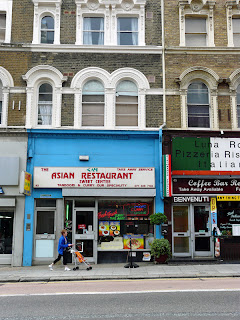.jpg) |
| 43 Kilburn High Road, site of Phillips first shop, 2012 |
|
|
|
|
An 1879 advert said his Kilburn shop had 15,000 items of sheet music in stock. It also pointed out:
Visitors from Town will see the shop on the left side of the road between the ‘Queen’s Arms’ and the L.N.W.R Kilburn station on the right. It is, however, only necessary to mention the name of the Establishment to the Conductor and the Omnibus will be stopped at the door.
Locals could rent a piano for 10 shillings a month. Alfred worked extremely hard and would visit homes and tune 5-6 pianos, even ten in a day, then return to run other parts of his business. One Xmas Eve he tuned 13!
In 1883, Alfred expanded into the music publishing firm of Phillips & Page in conjunction with Sydney Hubert Page, who like his partner, had previously worked as a piano tuner. The same year Alfred wrote to the composer Charles Gounod (most famous for his 1859 opera ‘Faust’), and obtained the copyright on several of his songs. This established the publishing company and when Gounod died in 1893, Phillips and Page traveled to Paris to secure the rights to Gounod’s remaining songs from his widow. Phillips was a successful composer and musical arranger and wrote a large number of hymns. He used many noms de plume, including ‘Sarakowski,’ for piano compositions and ‘Leigh Kingsmill’ for songs.
.jpg) |
| 70 Kilburn High, corner of West End Lane, site of Phillips shop, 2012 |
|
Business did well and in 1890 Phillips bought Number 70 and 72 Kilburn High Road on the opposite side of the road, at the corner of West End Lane. He demolished the two existing shops and built one large warehouse with room for 70 pianos on the ground floor. The architect was E.A. Heffer and the builder H.B. Oldrey of Kilburn. Four composer’s heads (Bach, Handel, Mozart and Beethoven), are still visible at first floor level. At one time Phillips also had branches in Ealing, Harlesden and Harrow.
Alfred retired from the business in 1898. In ‘Who’s Who in Music’ he gave his recreations as; gardening, woodcarving, bowls, tennis, chess, sketching, fishing, swimming, and sailing. His partner Sydney Page continued the music publishing firm.
In a 1904 advert the Kilburn shop advertised it stocked the ‘Nicole Record’. Nicole Freres established a record company in 1903 at Great Saffron Hill. Their records had a cardboard base coated with celluloid. The weakness in construction compared with shellac records, led to bankruptcy in 1906. The company also made the Nicolephone talking machine, which Phillips also sold.
The Kilburn music shop, run by his sons continued under the name of Phillips until 1931. Alfred died in Bognor Regis in 1936, and left an estate of £19, 756, worth about a million pounds today.
Unknown record shop
My old friend, Dan Shackell’s mother, Violet Kray, recalls a shop which sold records in the 1930s and 1940s. This was near 182 Kilburn High Road, almost opposite the State Cinema. She remembers that her brother bought their first record there, a dance band version of ‘Moonlight and Roses’ for their windup gramophone.
All Clear
‘All Clear’ was a small shop which sold gramophones and records at 270 Belsize Road just before the War. But the shop does not seem to have been there very long, and the company was dissolved in April 1939.
Blanks
Blanks Music Stores Ltd opened at 281 Kilburn High Road in 1951. A second shop was opened at 9 Kilburn Bridge in 1955, this closed about 1970, but by 1978 Blanks still had two shops at Numbers 281 and 273. The main double fronted shop was at 271 and 273 and sold musical instruments until it closed about 2012. Over the years many budding rock stars bought their first guitar or set of drums at this well-known Kilburn landmark.
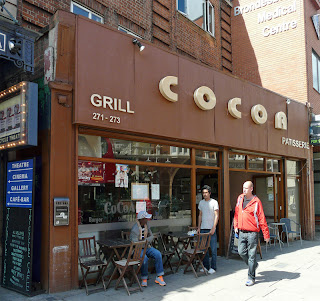.jpg) |
| Cocoa, next to the Tricycle Theatre, 2012. Site of Blanks Music Store |
|
Foxley’s
This shop in Exeter Parade, next to Kilburn Station, was run by Ray ‘Professor’ Foxley, a New Orleans style pianist who played with Ken Colyer and Chris Barber. Born in Birmingham in 1928, Ray learned straight piano when he was aged 14. Two years later he discovered boogie woogie, and he developed his style by listening to Fats Waller and Jelly Roll Morton records.
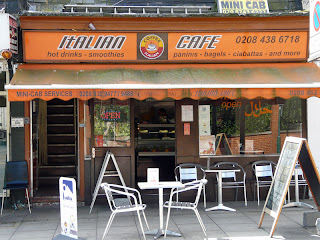.jpg) |
| Exeter Parade, site of Foxley’s 2012 |
Paul Vernon, a rare record dealer and blues expert, who had lived in Cricklewood and Maygrove Road, wrote about Foxley’s. He said that in the 1950s it was very hard to get R&B records. Ray Foxley responding to numerous requests, privately pressed 25 copies of an Amos Milburn record that he happened to have.
It sold out in one morning. Realising the potential, he contacted a friend who worked on the passenger ships sailing from Southampton and arranged to have him buy a regular selection of new R&B records in New York. These would then be copied and pressed on metal acetate singles, which Foxley sold across the counter. News quickly spread and Saturdays at Foxley’s became famous. An affable man, Foxley presided over what became, to all intents and purposes, a regular scheduled party. People came from all over London and as far afield as Birmingham, Bristol, Liverpool and Manchester. Friends would meet, talk, listen and buy – the session finished only when the last record had been sold – it served as a meeting place for musicians and fans at a time when there was little else to be had.
You can hear Amos Milburn’s ‘Chicken Shack Boogie’ and other tracks on You Tube:
The shop was there from 1955 to 1968. Dan Shackell remembers the perforated fiber board walls of the listening booths in Foxley’s where he bought his first 78, Gene Vincent’s ‘Lotta Lovin’ in 1957. You can hear it on:
Unknown name
Les Smith says he bought ‘Jailhouse Rock’ on the day it was released in 1957, from a record shop which opened for a short period on the Kilburn High Road between Netherwood Street and Palmerston Road.
Kilburn Record Centre, later Harlequin
163 Kilburn High Road, next to The Terrace. Paul Vernon remembers that it had racks of records outside. The small shop had opened by 1961, but was gone by 1968. It was taken over by the Harlequin Records and an advert for the Kilburn shop appeared in the ‘International Times’ 17 July 1970. The Harlequin chain of over 70 stores became part of Our Price Records, started by Gary Nesbitt in a shop called ‘Tape Revolution’ in Swiss Cottage in 1971. Our Price did not keep the Kilburn shop, so it probably closed in the early 1970s.
.jpg) |
| 163 Kilburn High Road, site of Kilburn Record Centre, 2012 |
Folkies
John Leslie came to 358 Kilburn High Road in 1977. He is a well known accordion player who has appeared on TV programmes such as, ‘Educating Archie,’ and worked with Max Bygraves and Tommy Cooper. He has played on backing tracks for films such as ‘Indiana Jones’ and written music for the Guildhall accordion examination. John teaches and runs London Accordions from the Kilburn shop. You can hear his opinions about Kilburn on an excellent short film by Mark James, ‘Kilburn High Road – The street where you live.’ John Leslie plays his accordion on the soundtrack of this film on You Tube: http://www.youtube.com/watch?v=8t2HrQUUujk
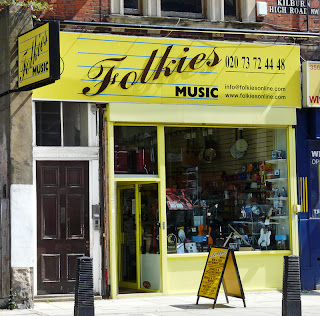.jpg) |
| Folkies, 2012 |
Ethnic Records
249 Kilburn High Road
Record producer, Clifton ‘Larry’ Lawrence, opened his first shop in 1973 in Kensal Green selling reggae records on his own Ethnic label. Then he moved to Kilburn High Road from 1974 to 1976, before going to Coldharbour Lane in Brixton from 1976 to 1983. While in Kilburn he released his album, ‘Out of One Man Many Dubs’ which included a track called ‘Kilburn High Rock Dub.’ Larry was born in Jamaica and recorded there before coming to the UK in 1966. He worked as a lorry driver and produced records for Trojan. He also acted as an unofficial road manager for touring Jamaican performers, including Bob Marley and the Wailers. This led him to become the in-house producer for Bruce White and Tony Cousins, Creole Records. Larry died in 2008 from cancer.
.jpg) |
| 249 Kilburn High Road, site of Ethnic Records, 2012 |
Ritz Records
1 Grangeway, next to the Grange Park
Mick Clerkin started Ritz Records in 1981 and produced Irish records. They had an office in Garrick Street, Covent Garden.
Just Discs
A small shop at 1a Cambridge Avenue, on the corner with Kilburn High Road, which closed in 2012. This might have been the site where Leon Parker found the debut ‘Climax Chicago Blues Band’ album he was looking for in the 1970s. He describes it on his blog,
Bassline Records
Recently there was a record shop at 333 Kilburn High Road, but nothing further is known about it.
Sounds II
In the basement of 256 Kilburn High Road. This seems to be the only remaining record shop in Kilburn today. It sells CDs and tapes. ‘Sounds I’ are in the Portobello Road.
West Hampstead Shops
Helga’s Record Shop
235 West End Lane, on the corner on Sandwell Crescent.
The site was redeveloped in the early 1970s, but until then the tiny corner premise, Helga’s Record Shop, drew youngsters like a magnet to buy the latest hit. It opened in 1958 and was so small that only a couple of customers could fit in the shop at any one time. The lady who ran the shop – presumably Helga herself – sat behind her narrow counter. There were one or two cramped racks of records. Marianne Colloms remembers buying all her earliest pop singles there for just over six shillings; EPs and LPs were too expensive for her.
‘I don’t think I ever ‘browsed’, just placed an order and collected it’. The shops occupying Numbers 235 and 239 were shoe-horned into what had served (many years previously), as the entry lodge for Sandwell House, a mansion that stood between West End Lane and Sumatra Road.
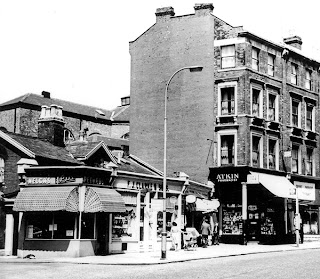.jpg) |
| Helga’s Records in the 1960s |
|
|
|
|
|
|
|
|
|
|
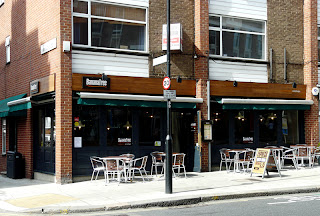.jpg) |
| Banana Tree Resturant, site of Helga’s, 2012 |
Shirley’s Record Shop
In November 1962 the singer Shirley Bassey came to West Hampstead and autographed the sleeve of one of her own records when she opened a shop at 172 West End Lane. It was part of her first husband, Kenneth Hume’s shop, ‘Books Unlimited’, which he’d opened in 1962. He was a gay film producer, whom Shirley Bassey married in 1961. The couple separated in 1964 and divorced in 1965, in the wake of the Shirley’s affair with actor Peter Finch
. In 1967 Kenneth
committed suicide. The shop closed about this time.
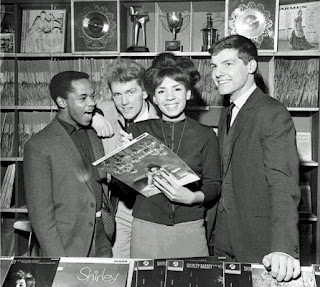.jpg) |
|
Shirley Bassey signs her album.
Looking on are, left to right, pop singers Danny Williams, Shane Fenton and Jess Conrad.
|
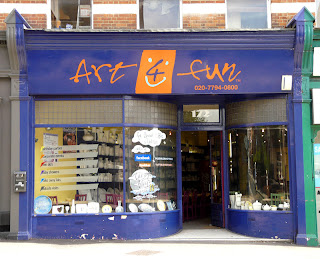.jpg) |
| Art 4 Fun, 172 West End Lane, site of Shirley’s Records, 2012 |
Joe Palmer’s record shop (name not known)
250 West End Lane, where Roni’s Bagels are today. In the 1970s, Joe Palmer, a professional musician, opened a shoe shop called ‘In Step’, in Midland Parade, a run of small shops (since demolished), on the railway bridge over the present Thameslink line. He was one of the founders of the successful ‘Peelers’ folk club in 1968, and from that grew ‘Peelers,’ a popular folk group led by Joe, with Tom Madden, and Jim Younger. Their 1972 album ‘Banish Misfortune’ used old acoustic instruments such as the dulcimer, banjo, tin whistle, guitar and concertina.
Joe soon abandoned shoes for records: his shop wasn’t quite as small as Helga’s, but it came close. He expanded to larger premises nearer to West End Green but maintained his interest in folk music, reforming the Peelers in 1982. His shop at 250 West End Lane had previously been a furniture and carpet shop. Marianne Colloms remembers the record shop – which became a video rental store still run by Joe – as very dark, maybe dark painted walls.
Today Joe Palmer lives in Spain and runs Sunshine FM on the Costa Blanca.
.jpg) |
| Roni’s Bagels, 250 West End Lane, 2012. Site of Joe Palmer’s |
.jpg)
.jpg)
.jpg)
.jpg)
.jpg)
.jpg)
.jpg)
.jpg)
.jpg)
.jpg)



.jpg)
.jpg)
It would appear that nearly every record shop in your piece now sells fast food. And we wonder why we have an obesity problem in this country.
I agree John!
and it’s causing a major litter problem as well…
I lived in kilburn as growing up in the 1970s
i think we all do.
You may have missed Muzik City on Willesden Lane. I remember it from the late 1960s and early 70s. You could hear reggae from a good distance all around it.
What about Unisound. In late June 1979, got a job at Unisound Music Shop, 215 Kilburn Hight Road NW6. Guitarist Mark E. Nevin was working there and later he went on to write the hit song Perfect, and played in the band Fairground Attraction. Mark lives in Camden.
While I was working at Unisound Music Shop, I sold the Pretenders a second hand 100w Peavy Bass Amp and Mike Oldfield (Tubular Bells ) A new Gibson L6S Studio Guitar.
I left Unisound in Feb 1980, and went to work for Group Gear, at Chappells of Bond St. That another story. Unisound close down a few yers later, and to date, the shop front is a supermarket.